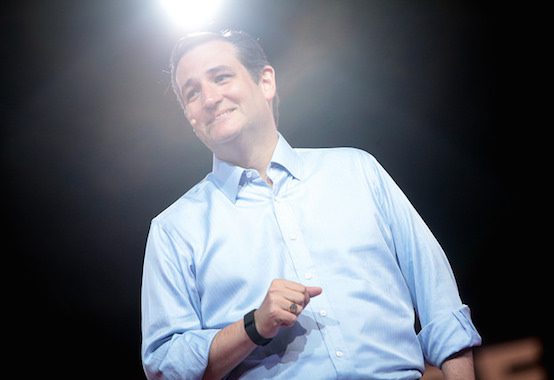I See A Ted Cruz Rising

It’s Ted Cruz’s turn in the spotlight. Now let’s see how he handles it.
He’s running a smart, data-driven campaign. He’s been working overtime in the early states, plus he’s got a true national operation, plus he’s got (as of the last report) more cash on hand for his campaign proper than any non-self-financed opponent (and he has significant super-PAC support as well). As a strongly anti-abortion evangelical Christian, he’s reaped the most benefit of any campaign from the continuing collapse of the Ben Carson bubble. As a consequence, he’s now leading in three of the last four polls in Iowa and polling second in all of the last four national polls.
His weakest early state – New Hampshire – is also a do-or-die state for multiple opponents with weak national numbers: Christie, Kasich, Fiorina, Paul, and probably even Bush. Which means that there’s a good chance they will divide the non-Trump vote, making it less-likely that any of them will end up either winning New Hampshire or coming in a strong second, and thereby emerging as an establishment-friendly alternative to Trump. In particular, that divided field makes it harder for Rubio to emerge as a dominant figure after New Hampshire. Not that Rubio seems to be doing all that much so far to win a state he likely needs almost as badly as Christie or Kasich.
And after New Hampshire, the calendar is dominated by conservative southern and western states where he feels most at home: South Carolina on Feb 20; Nevada on Feb 23; Alabama, Alaska, Arkansas, Colorado, Georgia, Oklahoma, Tennessee, Texas and Virginia on March 1; Kansas, Kentucky, Louisiana and Nebraska on March 5; Idaho and Mississippi on March 8th. There are some other states in that mix as well – Massachusetts, Minnesota, Vermont, Hawaii and Michigan. But that’s a thin skein of blue in what’s otherwise a field of red. And even then, on March 15th, when we get more moderate states like Florida, Illinois and Ohio, more conservative states like Missouri and North Carolina are also in the mix, with Arizona and Utah following hard upon. It isn’t until April that the blue wall comes into play.
A Ted Cruz path to the nomination depends on basically two things happening. First, Donald Trump has to continue to be the overwhelming leader in the polls in New Hampshire and nationally. Second, Cruz needs to put enough distance between himself and the rest of the non-Trump field in Iowa and South Carolina (preferably winning at least one of those states) to present as the most clearly viable alternative to Trump. And, so far, what he needs to happen has been happening. Which explains why commentators like Matt Yglesias are starting to ask whether it isn’t time for the GOP establishment to make its peace with Ted Cruz (while also musing about Democratic opposition research groups gearing up to go after him).
All of which means the stakes are higher for Cruz than for anybody else on stage tomorrow night, because the potential upside for him is larger than for anybody else. If that’s correct, and if the other campaigns see the world similarly, then tomorrow night should see a can of whoop-ass opened on Senator Cruz from his rivals.
But the risk is that if Cruz handles a wave of attacks effectively, they could help him rather than hurting him, both because whoever draws the most fire will be perceived as strongest and because most of those doing the firing will be perceived as being “establishment-friendly” – which is the kiss of death this season.
This being Ted Cruz we’re talking about, you’d think it wouldn’t be so hard for his rivals to get him to reveal just why nobody in Washington can stand him. Then again, they haven’t been able to dent Trump.
We’ll soon enough whether the spotlight is kind to Cruz, or whether he melts under its glare.
(P.S., speaking of Trump: one thing I imagine GOP bigs are game-theorying out right now is how an independent Trump run plays out with different GOP nominees, assuming they are able to nominate somebody other than Trump. I would imagine that a nominee like Bush would pretty much guarantee an independent Trump run, and that in that context Trump would draw far more votes from the GOP than from Clinton. I suspect, but am less certain, that a Rubio nomination would play out similarly. I think a Christie nomination is still pretty remote as a possibility, but my suspicion is that it would leave less room for an independent Trump run. Cruz, though, is the hardest for me to wrap my head around. There would clearly be room, in a Cruz-Clinton contest, for somebody to run as a centrist independent and get a significant number of votes. But Trump is not well-suited to that role – the real opening would be for a Michael Bloomberg type of candidate. Anyway, something to think about, and I assume people are thinking about it as I type.)
Comments